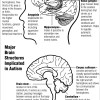Depression Genetics Suffer Major Setback
 A 2003, a paper by Caspi and colleagues offered tantalizing clues about the genetics of depression, in what was widely-acclaimed as a breakthrough paper for psychiatric genetics as a whole. Now, new research by Katleeen Merikangas at the National Institute of Mental Health queries the results taking us, according to Science magazine, back to the drawing board.
A 2003, a paper by Caspi and colleagues offered tantalizing clues about the genetics of depression, in what was widely-acclaimed as a breakthrough paper for psychiatric genetics as a whole. Now, new research by Katleeen Merikangas at the National Institute of Mental Health queries the results taking us, according to Science magazine, back to the drawing board.
What was so important about Caspi et al.?
The original Caspi paper of 2003 looked at a sample of 847 New Zealanders, and examined whether gene-environment interactions might lead to depression. The research team were particularly interested in genes involved in serotonin transportation and reception - serotonin has long been recognized as an important biochemical in the neurobiology of depression. They identified short and long versions of 5-HTT’s regulatory region. The short allele led to decreased gene expression and therefore fewer serotonin transporters in the the cell. Results of the study found that individuals with the short variant of the serotonin transporter 5-HTT predicted the onset of depression – but only if the individual was exposed to repeated environmental stress. The finding was important because it provided a blueprint for understanding gene-environment interactions: genes came to be viewed not so much as rigid determinants of fate, but part-players in a complex narrative.
What has changed?
A lot. The new paper by Merikangas and colleagues failed to substantiate the gene-environment association for 5-HTT. Normally, this might be viewed as a minor setback, but this study was a meta-analysis of 14 papers covering approximately 12,500 individuals – a huge data-pool by anybody’s standards. The group did confirm an association between stressful circumstances and depression (hardly big news). However, the serotonin transporter, 5-HTT did not enter into the equation. For many researchers in the field this is very disappointing and may force a rethink in our whole understanding of the disorder.
Caspi and co-author Terrie Moffitt are sticking by their guns, however. Science quotes them as saying that the new resarch “ignores the complete body of scientific evidence”, including studies in mice who have an elevated stress response as a result of their 5-HTT genotype. This may be the case, but Caspi and Moffitt are now swimming against the tide. It hard to argue with a sample of 12,500. Moreover, other sources had already begun to question the validity of the 5-HTT association. Recent whole-genome association studies, which have scanned a huge amount of genomes and found several thousand biomarkers did not turn up anything on 5-HTT.
While it is not time yet to close the book entirely on the association, I think it is time for some serious re-evaluation.
| Print article | This entry was posted by connolly on July 6, 2009 at 9:27 am, and is filed under G2C Online. Follow any responses to this post through RSS 2.0. You can skip to the end and leave a response. Pinging is currently not allowed. |









